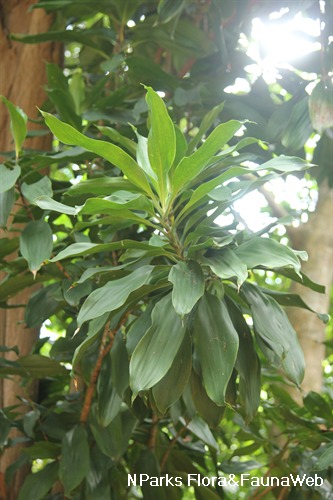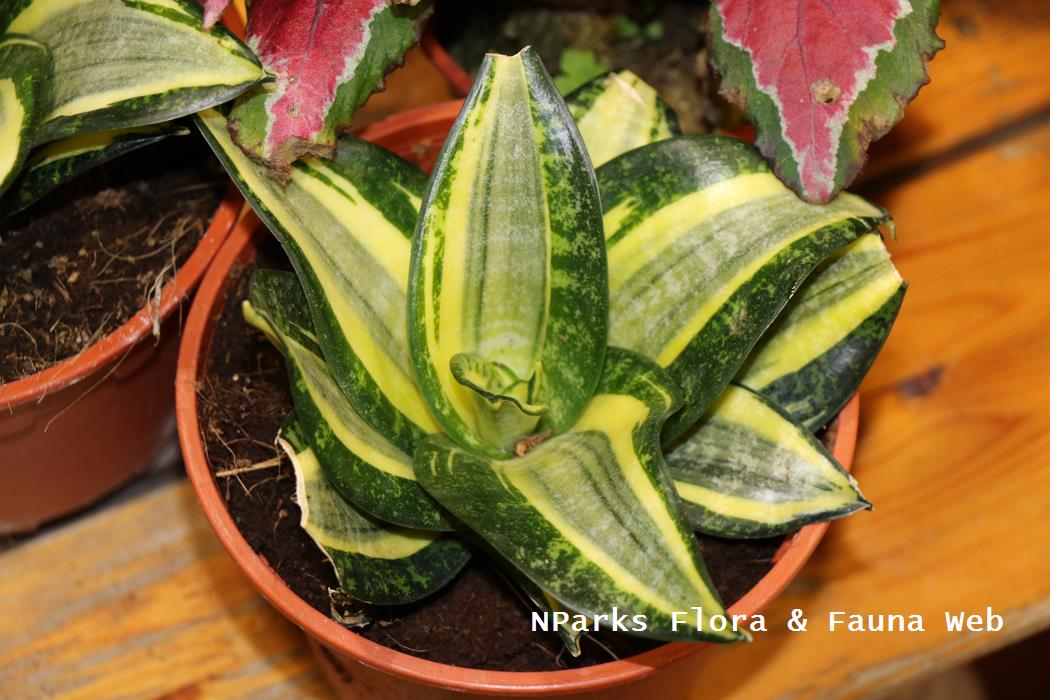
Back
Dracaena sanderiana Mast.
| Family Name: | Asparagaceae |
| Synonyms: | |
| Common Name: | Lucky Bamboo, Belgian Evergreen, Ribbon Plant, Sander's Dracaena |
Name
Classifications and Characteristics
| Plant Division | Angiosperms (Flowering Seed Plants) (Monocotyledon) |
|---|---|
| Plant Growth Form | Shrub |
| Mode of Nutrition | Autotrophic |
| Maximum Height | 2 m |
Biogeography
| Native Distribution | Africa |
|---|
Description and Ethnobotany
| Growth Form | A slender yet hardy, multi-stemmed, understorey shrub with attractive, erect to spreading, flexible, strap-shaped leaves that crowd toward the apex of the stems or spaced along part of the stems. |
|---|---|
| Foliage | Leaves simple, entire, sessile (attached directly by the base to the stem; without any stalk), usually strap-shaped to elliptic-lanceolate, crowded toward apex of stems or spaced along distal parts of stems, green. |
| Stems | Stems simple or branched, green, glabrous (smooth; not rough or hairy). |
| Flowers | Inflorescences branched,clustered, terminal, cream. |
| Fruit | Fruits are berries, globose (shaped like a globe; round), 1 to 3 seeded. |
| Cultivation | This low maintenance plant prefers bright, indirect sunlight, but tolerates low light. Strong, direct sunlight causes leaf scorch or yellowing, while shade causes leaf colours to fade. It grows well in either soil or directly in water. Since it is sensitive to chlorine, let tap water sit for one day before use. Regularly remove offshoots, cutting 2.5-5 cm away from the main stem. Propagate by cuttings. |
| Etymology | The genus epithet 'Dracaena' means 'female dragon' in ancient Greek and is derived from the word 'drakaina', a likely reference to the milky sap of Dracaena draco which dries to a resinous dye powder. The species epithet 'sanderiana' refers to German-English gardener, Henry Frederick Conrad Sander (1847 - 1920). |
| Ethnobotanical Uses | Cultural / Religious: According to Asian tradition, some people believe this plant brings good fortune. The number of stems and the shape in which the stems are woven together signify various meanings of prosperity and good health. Popular shapes include pineapples, pears, trellises, towers and ladders. |
Landscaping Features
| Desirable Plant Features | Ornamental Stems |
|---|---|
| Landscape Uses | Interiorscape/ Indoor Plant |
| Thematic Landscaping | Zen / Minimalist Garden |
| Usage Hazard - Cons | Toxic Upon Ingestion |
Plant Care and Propagation
| Light Preference | Semi-Shade |
|---|---|
| Water Preference | Moderate Water |
| Plant Growth Rate | Moderate |
| Rootzone Tolerance | Easy to Grow |
Foliar
| Mature Foliage Colour(s) | Green |
|---|---|
| Leaf Area Index (LAI) for Green Plot Ratio | 3.5 (Shrub & Groundcover - Monocot) |
Floral (Angiosperm)
| Flower Colour(s) | Cream / Off-White |
|---|
Image Repository
Others
| Master ID | 670 |
|---|---|
| Species ID | 1965 |
| Flora Disclaimer | The information in this website has been compiled from reliable sources, such as reference works on medicinal plants. It is not a substitute for medical advice or treatment and NParks does not purport to provide any medical advice. Readers should always consult his/her physician before using or consuming a plant for medicinal purposes. |







